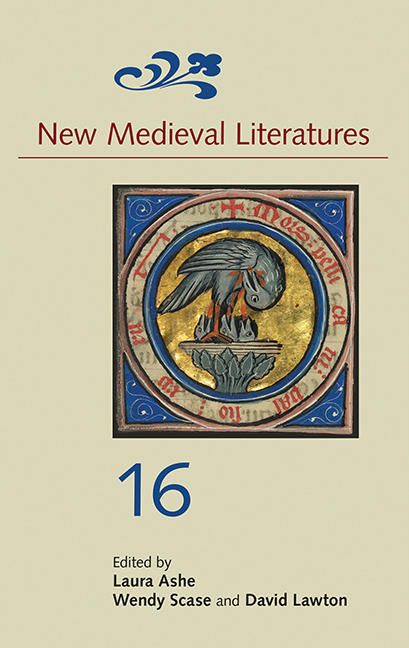Book contents
- Frontmatter
- Contents
- 1 The Book of the World at an Anglo- Norman Court: The Bestiaire de Philippe de Thaon as a Theological Performance
- 2 Monks, Money, and the End of Old English
- 3 Sustainability Romance: Havelok the Dane's Political Ecology
- 4 Locating the Border: Britain and the Welsh Marches in Fouke le Fitz Waryn
- 5 From disputatio to predicatio – and back again: Dialectic, Authority and Epistemology between the Roman de la Rose and the Pèlerinage de Vie Humaine
- 6 Mixed Feelings in the Middle English Charlemagne Romances: Emotional Reconfiguration and the Failures of Crusading Practices in the Otuel Texts
- 7 Circularity and Linearity: The Idea of the Lyric and the Idea of the Book in the Cent Ballades of Jean le Seneschal
- 8 ‘What shal I calle thee? What is thy name?’: Thomas Hoccleve and the Making of ‘Chaucer’
8 - ‘What shal I calle thee? What is thy name?’: Thomas Hoccleve and the Making of ‘Chaucer’
Published online by Cambridge University Press: 05 July 2016
- Frontmatter
- Contents
- 1 The Book of the World at an Anglo- Norman Court: The Bestiaire de Philippe de Thaon as a Theological Performance
- 2 Monks, Money, and the End of Old English
- 3 Sustainability Romance: Havelok the Dane's Political Ecology
- 4 Locating the Border: Britain and the Welsh Marches in Fouke le Fitz Waryn
- 5 From disputatio to predicatio – and back again: Dialectic, Authority and Epistemology between the Roman de la Rose and the Pèlerinage de Vie Humaine
- 6 Mixed Feelings in the Middle English Charlemagne Romances: Emotional Reconfiguration and the Failures of Crusading Practices in the Otuel Texts
- 7 Circularity and Linearity: The Idea of the Lyric and the Idea of the Book in the Cent Ballades of Jean le Seneschal
- 8 ‘What shal I calle thee? What is thy name?’: Thomas Hoccleve and the Making of ‘Chaucer’
Summary
‘The chief merit of Hoccleve is that he was the honourer and pupil of Chaucer. Dukes don't matter; Chaucer does.’ Hoccleve's critical reputation has advanced considerably since Frederick Furnivall wrote these lines in 1892, and his ‘merits’ have expanded beyond being an ‘honourer and pupil of Chaucer’; nevertheless, the degree to which Hoccleve's reputation is anchored in Chaucer remains a key concern in Hoccleve scholarship. Furnivall refers foremost to Hoccleve's poem The Regiment of Princes in these lines – the poem in which Hoccleve names Chaucer and puts him forward as ‘the first fyndere of our fair langage’, ‘universel fadir in science’, and ‘mirour of fructuous entendement’. Furnivall's succinct statement – ‘Dukes don't matter; Chaucer does’ – points to one of the more salient aspects of that poem: the level of praise bestowed upon Chaucer affords the poet a conspicuous and singular position in the poem. It equips him with a fame that eclipses that of any other individual in the poem, including that of the poem's intended recipient – Prince Henry. No one else in the Regiment appears with such fanfare as Father Chaucer. Within the world of the poem, Chaucer does, indeed, matter. In the real world of London circa 1410, Chaucer also mattered, but there is scant evidence that he enjoyed the singular reputation that Hoccleve affords him in the Regiment. This divide – between the ‘Chaucer’ that Hoccleve creates in his poem, and the Chaucer that predates the Regiment – is one of the main focuses of the present article. This study views the specific version of Chaucer presented in the Regiment as a Hocclevian invention, and examines the literary, political, and ecclesiastical contexts that align in Hoccleve's presentation of Chaucer.
Hoccleve has enjoyed a critical rehabilitation in recent decades, and the effort to reassess and reposition his poetry has led to various reconfigurations of the Hoccleve–Chaucer relationship. For critics such as A. C. Spearing and Seth Lerer, Hoccleve served as one example of the weaker ‘Chaucerian’ tradition of writers that appeared in the fifteenth century. Julia Boffey speaks of the ‘anxiety of influence’ that has been ‘signalled as a feature of post- Chaucerian writing’ by such critics, and indeed Harold Bloom's model would seem to fit here, in the case of a poet who describes himself as ‘childissh’ in relation to a ‘fadir Chaucer’, ‘my fadir’.
- Type
- Chapter
- Information
- New Medieval Literatures , pp. 250 - 276Publisher: Boydell & BrewerPrint publication year: 2016

